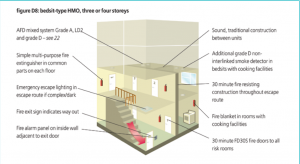HMO License

You must have an HMO license if you’re renting out a large HMO in England or Wales. Your property is defined as a large HMO if all of the following apply:
- It is rented to 5 or more people who form more than 1 household.
- Some or all tenants share toilet, bathroom or kitchen facilities.
- At least 1 tenant pays rent (or their employer pays it for them).
Even if your property is smaller and rented to fewer people, you may still need a license depending on the area. You can find out if you need an HMO license in this instance by contacting your local council.
An HMO license is valid for 5 years and MUST be renewed before it expires.
Consideration must be taken if the property can POTENTIALLY be let to 5 or more people. I.e If you have a 5 bedroom house and you are only it letting to 4 people, the potential is there to let it to more people, and therefore may still require an HMO license.
A lenders surveyor may make comments that the potential is there to be a 5 bed HMO, therefore making the HMO license application mandatory for them to offer a mortgage.
So to apply for the license you need to get your other ducks in a row.
Questions vary per council but below is a link to Northampton HMO guidance note:
Some of the things to consider within the license are below:-
Floor Plan:
You will most certainly need a floor plan to scale, drawn with sizes of rooms, to ensure that they meet the minimum legal sizes. 6.51 Sqm for single occupant 10.22 Sqm for a couple (Oct 2018).
That’s pretty much a 9ft by 9ft room in old money. So if you are looking at a house with a box room it won’t be useable for a single let.
Gas Safety:
All gas appliances including boiler must be checked annually.
https://www.gassaferegister.co.uk/media/1442/landlords-gas-safety-requirements.pdf
Electricity Safety:
All electrics must be checked every 5 years and all appliances PAT tested annually.
Fire Regulations:
Fire risk assessment, fire doors and closers, interlinked smoke detectors, Heat and CO2 detectors, emergency lighting and fire fighting equipment must be installed.

